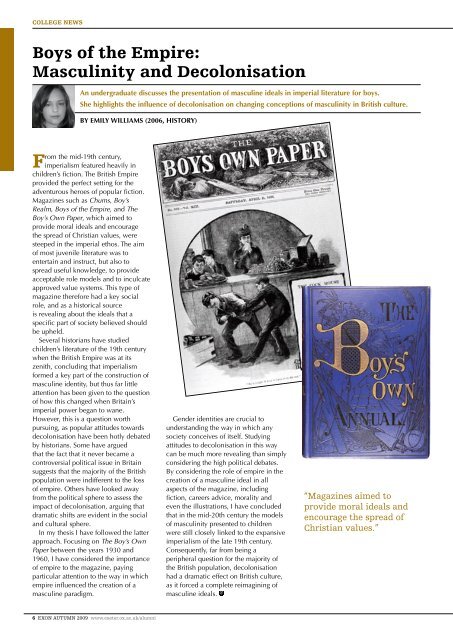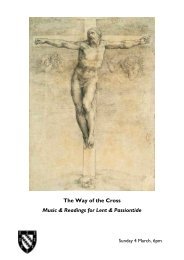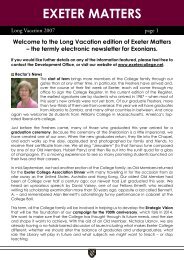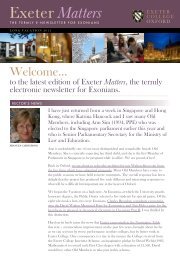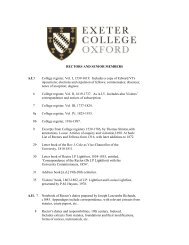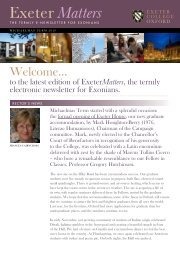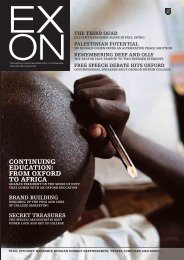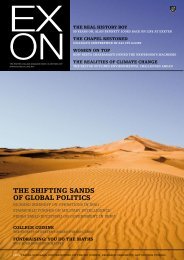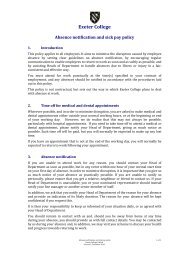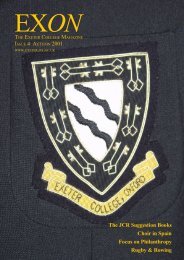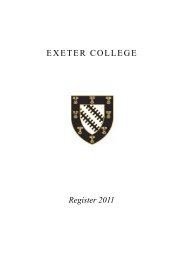Exon. - Exeter College - University of Oxford
Exon. - Exeter College - University of Oxford
Exon. - Exeter College - University of Oxford
You also want an ePaper? Increase the reach of your titles
YUMPU automatically turns print PDFs into web optimized ePapers that Google loves.
COLLEGE NEWS<br />
Boys <strong>of</strong> the Empire:<br />
Masculinity and Decolonisation<br />
An undergraduate discusses the presentation <strong>of</strong> masculine ideals in imperial literature for boys.<br />
She highlights the influence <strong>of</strong> decolonisation on changing conceptions <strong>of</strong> masculinity in British culture.<br />
By Emily Williams (2006, History)<br />
From the mid-19th century,<br />
imperialism featured heavily in<br />
children’s fiction. The British Empire<br />
provided the perfect setting for the<br />
adventurous heroes <strong>of</strong> popular fiction.<br />
Magazines such as Chums, Boy’s<br />
Realm, Boys <strong>of</strong> the Empire, and The<br />
Boy’s Own Paper, which aimed to<br />
provide moral ideals and encourage<br />
the spread <strong>of</strong> Christian values, were<br />
steeped in the imperial ethos. The aim<br />
<strong>of</strong> most juvenile literature was to<br />
entertain and instruct, but also to<br />
spread useful knowledge, to provide<br />
acceptable role models and to inculcate<br />
approved value systems. This type <strong>of</strong><br />
magazine therefore had a key social<br />
role, and as a historical source<br />
is revealing about the ideals that a<br />
specific part <strong>of</strong> society believed should<br />
be upheld.<br />
Several historians have studied<br />
children’s literature <strong>of</strong> the 19th century<br />
when the British Empire was at its<br />
zenith, concluding that imperialism<br />
formed a key part <strong>of</strong> the construction <strong>of</strong><br />
masculine identity, but thus far little<br />
attention has been given to the question<br />
<strong>of</strong> how this changed when Britain’s<br />
imperial power began to wane.<br />
However, this is a question worth<br />
pursuing, as popular attitudes towards<br />
decolonisation have been hotly debated<br />
by historians. Some have argued<br />
that the fact that it never became a<br />
controversial political issue in Britain<br />
suggests that the majority <strong>of</strong> the British<br />
population were indifferent to the loss<br />
<strong>of</strong> empire. Others have looked away<br />
from the political sphere to assess the<br />
impact <strong>of</strong> decolonisation, arguing that<br />
dramatic shifts are evident in the social<br />
and cultural sphere.<br />
In my thesis I have followed the latter<br />
approach. Focusing on The Boy’s Own<br />
Paper between the years 1930 and<br />
1960, I have considered the importance<br />
<strong>of</strong> empire to the magazine, paying<br />
particular attention to the way in which<br />
empire influenced the creation <strong>of</strong> a<br />
masculine paradigm.<br />
Gender identities are crucial to<br />
understanding the way in which any<br />
society conceives <strong>of</strong> itself. Studying<br />
attitudes to decolonisation in this way<br />
can be much more revealing than simply<br />
considering the high political debates.<br />
By considering the role <strong>of</strong> empire in the<br />
creation <strong>of</strong> a masculine ideal in all<br />
aspects <strong>of</strong> the magazine, including<br />
fiction, careers advice, morality and<br />
even the illustrations, I have concluded<br />
that in the mid-20th century the models<br />
<strong>of</strong> masculinity presented to children<br />
were still closely linked to the expansive<br />
imperialism <strong>of</strong> the late 19th century.<br />
Consequently, far from being a<br />
peripheral question for the majority <strong>of</strong><br />
the British population, decolonisation<br />
had a dramatic effect on British culture,<br />
as it forced a complete reimagining <strong>of</strong><br />
masculine ideals.<br />
“Magazines aimed to<br />
provide moral ideals and<br />
encourage the spread <strong>of</strong><br />
Christian values.”<br />
6 EXON Autumn 2009 www.exeter.ox.ac.uk/alumni


